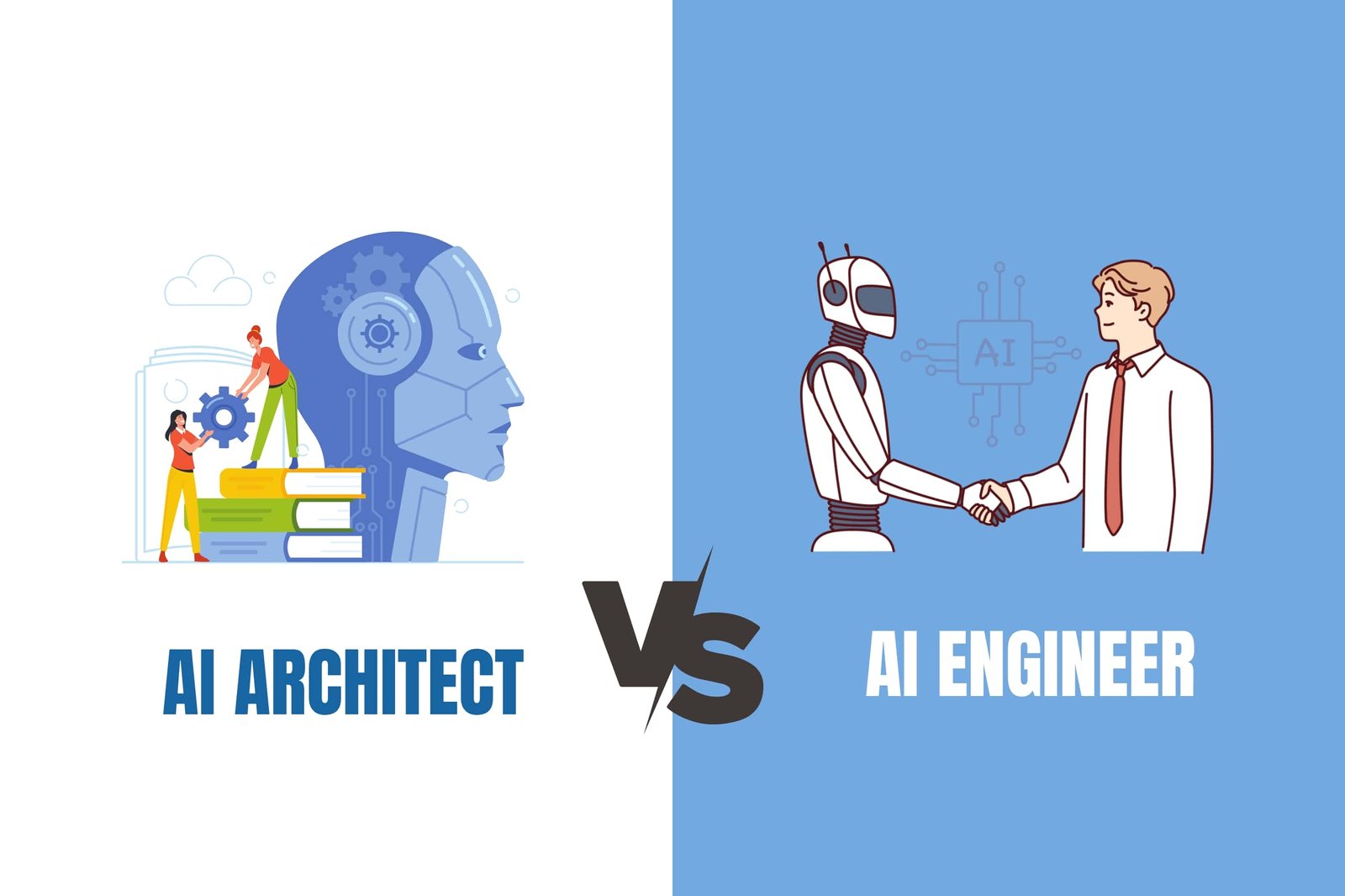The AI domain is expanding and is actively penetrating across different business niches. There are several developments taking place in this domain. Companies are actively deploying AI technologies to run their businesses smoothly. At the same time, they are also actively hiring professionals with AI expertise. Hence, AI architect skills are in great demand.
In this comprehensive guide, we will delve into the realm of AI architecture, exploring who an AI Architect is, their roles and responsibilities. Additionally, we will address frequently asked questions regarding the salary, scope, and future prospects of this exciting career. To sum it up, you will get to know the right AI Architect roadmap that will pave the way for success.
Key Statistics on The Growth of AI Domain
- AI is expected to see an annual growth rate of 37.3% from 2023 to 2030.
- The salary of an Artificial Intelligence Architect in India ranges between ₹ 18.0 Lakhs to ₹ 56.7 Lakhs. Their average annual salary is ₹ 31.8 Lakhs.
- As per World Economic Forum research, AI will generate around 97 million jobs
- Forbes Advisor report showcases that around 64% of business owners believe that AI will improve customer relationships.
Who is an AI Architect?
An AI Architect is a skilled professional responsible for designing and implementing artificial intelligence solutions within an organization. They possess a deep understanding of AI technologies, algorithms, and frameworks and have the ability to translate business requirements into robust AI systems.
AI Architects work closely with cross-functional teams, including data scientists, engineers, and business stakeholders, to design and deliver AI solutions that drive innovation, efficiency, and competitive advantage.
AI Engineer vs. AI Architect:
While AI Engineers and AI Architects are both involved in the development of AI systems, there are notable distinctions between their roles. AI Engineers focus primarily on implementing and deploying AI models and algorithms, working closely with data scientists and machine learning experts.
Their responsibilities often revolve around coding, data preprocessing, model training, and optimization. On the other hand, AI Architects take a broader perspective, encompassing the entire AI solution lifecycle.
They are responsible for designing the overall AI infrastructure, determining the best algorithms and frameworks, and ensuring the scalability, reliability, and security of the AI systems.
Here’s a tabular representation highlighting the key distinctions between an AI Engineer and an AI Architect:
| AI Engineer |
AI Architect |
|
| Focus | Implementation and deployment of AI models and algorithms | Designing and implementing AI solutions, overseeing the entire AI solution lifecycle |
| Responsibilities | Coding, data preprocessing, model training, optimization | Requirement analysis, solution design, technology evaluation, infrastructure design, collaboration |
| Technical Skills | Strong programming skills (Python, R, Java), AI frameworks (TensorFlow, PyTorch) | Programming skills, AI technologies, system design, architecture, data manipulation |
| Collaboration | Works closely with data scientists, machine learning experts, and engineers | Collaborates with cross-functional teams, including data scientists, engineers, and business stakeholders |
| Scope | Focused on the technical implementation of AI algorithms and models | Takes a broader perspective, encompassing the entire AI infrastructure and solution design |
| Decision-making | Primarily involved in implementing and optimizing AI models based on specifications | Involved in high-level decision-making, such as selecting appropriate models, frameworks, and technologies |
| Communication | Communicates with technical team members to implement AI solutions | Effective communication with technical and non-technical stakeholders, conveying complex ideas |
| Leadership | Primarily focused on executing tasks within the AI development process | Provides leadership in AI solution design, collaborates with teams, and oversees project delivery |
| Career Path | Can progress to Senior AI Engineer, Machine Learning Engineer, or AI Researcher roles | Can progress to Senior AI Architect, AI Manager, or AI Consultant roles |
It’s important to note that the roles and responsibilities may vary depending on the organization, project, and specific requirements. The table above provides a general overview of the key differences between an AI Engineer and an AI Architect.
AI Architect Roles & Responsibilities
One of the key aspects that you need to know when it comes to AI Architect Roadmap, it is equally significant to know more the key roles and responsibilities. The responsibilities of an AI Architect encompass a wide range of activities throughout the AI project lifecycle. Some key responsibilities include:
-
Requirement Analysis
Collaborating with stakeholders to understand business needs and identifying AI opportunities within the organization.
-
Solution Design
Creating a high-level architectural design that encompasses data pipelines, model training, deployment strategies, and integration with existing systems.
-
Technology Evaluation
Assessing different AI technologies, platforms, frameworks, and tools to determine the most suitable options for the organization’s requirements.
-
Model Selection and Optimization
Identifying appropriate machine learning models and techniques, fine-tuning parameters, and optimizing the performance of AI systems.
-
Infrastructure Design
Defining the underlying infrastructure requirements, including hardware, software, and cloud resources, to support AI development, training, and deployment.
-
Collaboration and Communication
Working closely with cross-functional teams, including data scientists, engineers, and business stakeholders, to ensure effective collaboration and communication throughout the AI project.
-
Performance Monitoring and Enhancement
Continuously monitoring the performance of AI systems, identifying bottlenecks, and implementing enhancements to improve efficiency, accuracy, and reliability.
How to Become an AI Architect?
Becoming an AI Architect requires a combination of technical expertise, domain knowledge, and soft skills. Here are the key steps to embark on the path towards becoming an AI Architect:
Acquire a Strong Foundation
Start by building a solid foundation in computer science, mathematics, and statistics. Pursue a bachelor’s degree in computer science or a related field to gain a comprehensive understanding of algorithms, data structures, programming languages, and statistical analysis.
Develop Programming Skills
Master programming languages such as Python, R, or Java, which are widely used in AI development. Gain hands-on experience in implementing algorithms and working with AI frameworks such as TensorFlow, PyTorch, or scikit-learn.
Learn Machine Learning and Deep Learning
Deepen your understanding of machine learning algorithms, statistical modelling, and deep learning architectures. Explore topics such as regression, classification, clustering, neural networks, and natural language processing.
Gain Practical Experience
Apply your theoretical knowledge by working on real-world AI projects. Seek internships, participate in Kaggle competitions, or contribute to open-source projects to gain practical experience in developing AI solutions.
Expand Domain Knowledge
Familiarize yourself with the domain you wish to specialize in, such as healthcare, finance, or e-commerce. Understand the specific challenges and opportunities within the domain to design tailored AI solutions.
Pursue Advanced Education
Consider pursuing a master’s degree or a specialized certification program in artificial intelligence or a related field. Advanced education can provide you with in-depth knowledge and exposure to cutting-edge AI techniques.
Hone Soft Skills
Develop strong communication, leadership, and problem-solving skills. AI Architects often collaborate with diverse teams and must effectively convey complex ideas to both technical and non-technical stakeholders.
Stay Updated
Keep up with the latest advancements in the field of AI by following industry blogs, attending conferences, and engaging in continuous learning. The field of AI is constantly evolving, and staying updated is crucial to remain competitive.
Skills of an AI Architect
To excel as an AI Architect, you need a diverse skill set that combines technical proficiency, analytical thinking, and effective communication. Some essential skills for an AI Architect include:
Strong Programming Skills
Proficiency in languages like Python, R, or Java, and experience with AI frameworks such as TensorFlow, PyTorch, or scikit-learn.
In-depth Knowledge of AI Technologies
Comprehensive understanding of machine learning algorithms, deep learning architectures, and statistical modelling techniques.
Data Manipulation and Preprocessing
Proficiency in data preprocessing techniques, feature engineering, and data wrangling to ensure the quality and reliability of input data.
System Design and Architecture
Ability to design scalable, reliable, and secure AI systems that meet the organization’s requirements and align with best practices.
Problem-solving and Analytical Thinking
Aptitude for analyzing complex problems, identifying effective solutions, and making informed decisions to overcome challenges.
Collaboration and Communication
Strong interpersonal skills to collaborate effectively with cross-functional teams and communicate complex ideas to both technical and non-technical stakeholders.
Domain Knowledge
Familiarity with the specific domain or industry you work in, enabling you to design AI solutions that align with industry requirements and challenges.
Wrapping it up !!!
As the penetration of AI continues to grow, the role of an AI architect becomes even more significant. Acquiring a solid foundation in this field, will not only open the avenues of growth but also secure your job in the future.
By acquiring a solid foundation in computer science, gaining expertise in machine learning and deep learning, and honing essential technical and soft skills, you can embark on a rewarding career as an AI Architect. There are several online platforms offering courses in artificial intelligence, data science, machine learning and others. By and rolling for one such program, you can begin your learning journey.
The path to becoming an AI Architect requires continuous learning, practical experience, and a passion for innovation. By staying updated with the latest advancements and embracing the challenges and opportunities of the field, you can make a significant impact in the ever-evolving realm of AI.
Frequently Asked Questions
Q: What is the salary of an AI Architect?
A: The salary of an AI Architect varies depending on factors such as experience, location, and the organization. On average, an AI Architect can expect a competitive salary ranging from between ₹ 18.0 Lakhs to ₹ 56.7 Lakhs.
Q: What is the scope of AI architecture?
A: The scope of AI architecture is vast and expanding rapidly. As organizations across industries embrace artificial intelligence to drive innovation and gain a competitive edge, the demand for skilled AI Architects continues to grow.
The scope encompasses designing and implementing AI solutions, optimizing performance, ensuring scalability and security, and staying updated with emerging technologies.
Q: Is AI architecture a good career?
A: Yes, AI architecture is a promising career path. With the increasing demand for AI solutions, the role of an AI Architect has become critical in driving technological advancements. Moreover, the AI market in India is projected to grow at a CAGR of 20.2% to reach US$ 7.8 billion by 2025 from US$ 3.1 billion in 2020. This showcases a positive growth curve in the AI domain.
It offers excellent growth opportunities, competitive salaries, and the chance to work on cutting-edge projects at the forefront of innovation. So, if you are willing to go ahead with AI expertise, you can consider making a career in this field.
Q: Is AI in demand in the future?
A: Yes, AI is expected to be in high demand in the future. As industries across the globe continue to adopt AI technologies, the demand for professionals skilled in AI development, architecture, and implementation is projected to grow significantly.
Q: How long does it take to become an AI Architect?
A: The path to becoming an AI Architect varies based on individual circumstances and learning pace. Typically, it takes several years to build the necessary foundational knowledge, gain practical experience, and develop the skills required to excel in this role.
It may take around 5 to 7 years or more to become an accomplished AI Architect, depending on one’s dedication, educational background, and prior experience.
Start Your Learning Journey with Pickl.AI
Acquiring the right skill set is the apt way to make a start in your career. To experience a progressive professional growth, you can enrol with Pickl.AI. This platform provides data science courses that cover the core concepts along with practical applications. Moreover, pickle.AI also offers a data science job guarantee programme, which helps you acquire a job as soon as you successfully finish the course.
There are umpteen career options for data experts in the years to come. Acquiring skill sets of data science will also help you expand your learning horizons to allied technologies like artificial intelligence and machine learning. If you are keen to give a start to your career in this domain, connect with Pickl.AI today.











